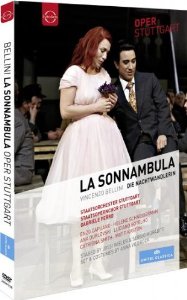For those of you still queasy after Mary Zimmerman’s sophomoric snarknado attack on Bellini’s La Sonnambula, the new DVD
of the Stuttgart Opera production by Jossi Wieler and Sergio Morabito should provide a bracing restorative. Here is a production that takes the work very, very seriously. This is La Sonnambula via Shirley Jackson—a ghost story with an overlay of communal guilt and hints of cycles of abuse and abandonment.
The curtain rises on the common room on the ground floor of Lisa’s inn; no rustic mill, but there is a gently flowing stream visible through a rear window. It’s an ominous space lined with locked wardrobes and a heavy scattering of votive candles. Mail overflows the mailboxes and the tables are scattered about as if the previous occupants had fled in a hurry. It’s easy to believe this place is haunted.
There is something haunted about Amina, too. She begins her entrance music unseen at the top of a staircase leading down into the common room. As her voice reverberates above the room, the villagers look around uneasily and become quite visibly relieved when she finally appears, still amongst the living. Still, they are unable to look her in the eyes as she wanders dreamily amongst them; they appear to be ashamed by their role in what is about to happen. When Elvino appears, he discretely pays each of them off and they eagerly pound down the celebratory slivovitz.
The Count enters – through a different door that seems to be the only portal into the realm outside the village. There is a palpable chemistry between Amina and the Count. He doesn’t just inflame Elvino’s jealousy; he gets the rebellious townspeople riled up, too. They have no need to have the lord of the castle back in residence. The Count’s return has also stirred up the ghost that the villagers had just warned him about.
She appears at the end of Elvino’s confrontation with Amina over her flirtatious behavior and then again when Amina has sleep-wandered into the Count’s room. The ghost wears a disheveled inside-out shift that has been put on backwards and the sleepwalking Amina wears the same outfit in the same way. This ghost, Amina’s mother and by entering the count’s bedroom she acts out her mother’s sad fate all over again.
During Amina’s final sleepwalking episode, she enters in a stupefied daze and bloody. She has miscarried. Her child with Elvino, not the flowers he proffered to her in the first act, is the “blossom that has perished too soon.” Elvino’s interjections of despair in the aria are gut-wrenching wails of sadness and guilt. When Amina wakens, her joy at discovering that she is innocent of sleeping with the count quickly turns to despair at the realization the village has known all along that she was never an innocent girl. She sings a desperate “Ah non giunge” to the despondent Elvino as the dead spirit of Amina’s mother returns a last time to confront the horrified count, Amina’s father. Blackout.
There is much to admire in this riveting production. It elegantly deals with the troubling holes in the plot (Why did Elvino dump Lisa for Amina? Who exactly is the Count? Is there really a ghost?) and uses the slow revelation of the answers to those questions to provide dramatic impetus to the show. Also, the directors, cogently argue their perspective that the work deals with the dangers of discovering one’s own true nature.They do this without coercing the music or the text to fit their scenario. Sure, the opera doesn’t get happy ending in the libretto, but is it that big a stretch to hear agitation rather than exhilaration in the manic final cabaletta? My biggest complaint was the relentless flow of non-stop action. Singing alone was never allowed to carry the show forward; there is some Grand Guignol business during “Ah! non credea” that really should have been jettisoned. I don’t want productions that devolve into concert stagings in the big moment but this performance drew focus away from the singing because there was just so much going on.
The Amina, Anna Durlovski gave a formidable performance. She sings with great facility and easily produced interpolated high notes. Moreover, she displayed an impressive palette of vocal colorations of emotional shadings. I missed some of the tender pathos required for the great Act II recitative and aria, but her bravura, emotionally complex rendition of the final cabaletta was stunning. Her Elvino, Luciano Botelho sang with great sweetness and tenderness, when he allowed himself to. He acted with great conviction , but he was audibly taxed by his characters more impassioned outbursts.
As might be expected, the Lisa, has a lot to do in this production, and for once, her jealousy seemed more than just a convenient contrivance. Cariona Smith made the most of this opportunity dramatically, but her voice was shrill, bordering on grating. As her ever-optimistic suitor, Alessio, Motti Kastón was appropriately puppy dog-like, but his singing was prematurely wobbly . Helene Schneiderman brought some welcome fierceness to her part Amina’s adoptive mother Teresa. Enzo Capuano, brought an old pro’s skill, style, and occasional tendency to disagree with the conductor to the part of the count. Gabriele Ferro conducted with style and evident affection for the work, even when he drove things forward briskly.
Anna Viebrock provided the impressively detailed sets and costumes; they make a considerable contribution to establishing the narrative and mood of the staging. Special kudos should go to the TV Director, Marcus Richardt who provided a judicious balance of close-ups of pertinent details with fuller views of the stage proceedings. Many of those close-ups were of the remarkable chorus. Not only do they sing with style and nuance, but they also act with conviction and attention to detail. All in all, highly recommended.




